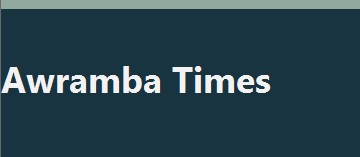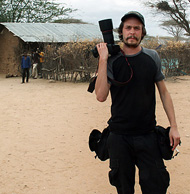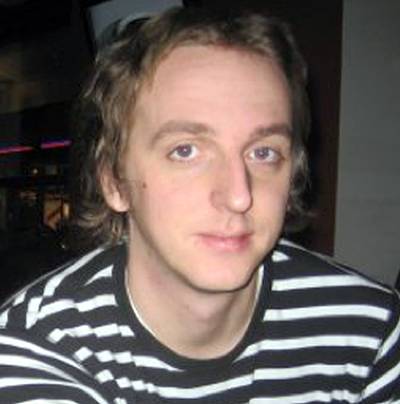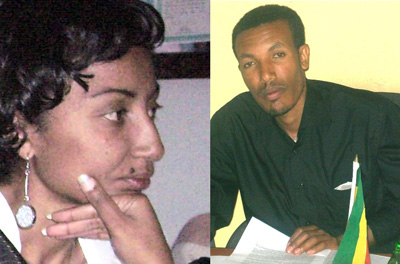There are fears that Ethiopian journalists are being targeted for their critical reporting in violation of their right to freedom of expression, and English PEN is therefore calling on the Ethiopian authorities to clarify the reason for their arrest immediately.
Detained without charges
On 19 June 2011, security agents reportedly arrested Woubshet Taye,  deputy editor of the independent weekly “Awramba Times“, at his home in the capital Addis Ababa and confiscated various documents, cameras, CDs and copies of the newspaper.
deputy editor of the independent weekly “Awramba Times“, at his home in the capital Addis Ababa and confiscated various documents, cameras, CDs and copies of the newspaper.
Two days later, on 21 June, Reeyot Alemu a regular contributor to the independent weekly newspaper “Feteh”, was reportedly detained at a secondary school where she teaches English in the capital Addis Ababa; her home was also searched by police. Both are being detained incommunicado without charge at the federal investigation centre at Maekelawi Prison in Addis Ababa.
The authorities are yet to disclose the reason for either arrest. However, according to local journalists, Alemu’s arrest could be related to her articles criticising the ruling EPRDF party.
Her 17 June column in “Feteh” was reportedly critical of the EPRDF’s public fundraising methods for the Abay Dam project, and drew parallels between Prime Minister Meles Zenawi and the Libyan leader Muammar Gaddafi.
In Taye’s case, it has been suggested that his arrest may be linked to his alleged sympathy for the banned political party Ginbot 7, which the Ethiopian government recently designated as a terrorist organisation. Awramba Times provides in-depth political coverage.
Journalists belonged to the group of terrorists?
On 29 June government spokesman Shimelis Kemal announced in a press conference in the capital, Addis Ababa, that Taye and Alemu were among nine people arrested on suspicion of organizing a terrorist network. The group was also accused of planning attacks on infrastructure, telecommunications, and power lines in the country, according to news reports.
Kemal accused the nine of having links with an unnamed international terrorist group and Ethiopia’s neighbor, Eritrea, according to news reports. Neither journalist has yet been charged, pending investigations, according to Kemal.
“These accusations against Woubshet Taye and Reeyot Alemu must be viewed in light of the Ethiopian administration’s longstanding practice of using trumped-up charges to silence and jail critical independent journalists,” said CPJ Africa Advocacy Coordinator Mohamed Keita.
“It is outrageous that a government spokesman should publicly accuse journalists of terrorism when they have not been charged with any crime and are unable to respond because they are in detention. They should be freed immediately,” added Mohamed Keita.
In an interview with Bloomberg News, Kemal said the arrests of the two journalists had “nothing to do with viewpoints they have published.”
Swedish journalists – persona non grata
Two Swedish journalists reporting on the activ ities of armed separatists operating in an oil-rich province of eastern Ethiopia have been detained without charge since 30 June.
ities of armed separatists operating in an oil-rich province of eastern Ethiopia have been detained without charge since 30 June.
Ethiopian security forces arrested photojournalist Johan Persson (right) and reporter Martin Schibbye (below), contributors to the Sweden-based agency Kontinent, along the border with neighboring Somalia, government spokesman Bereket Simon told Committee to Protect Journalists (CPJ).
The journalists had been embedded with Ogaden National Liberation Front rebels who had come under attack by government forces, said Simon. Persson, 29, was wounded in the hand and Schibbey, 30, in the shoulder during the fighting, according to news reports. The two received medical treatment under police custody in the border city of Jijiga, Swedish Foreign Ministry spokeswoman Cecilia Julin reported.
Journalists captured as rebels
Persson and Schibbey were moved from Jijiga to the capital, Addis Ababa, on 5 July evening and were expected to appear in court in the near future, Simon added. In a report, the Ethiopian government-controlled broadcaster claimed that security forces killed 15 rebels and captured six others, including the journalists, in the raid.
Simon alleged the two journalists had crossed over the border from Somalia without accreditation. CPJ research shows that Ethiopia has blocked independent access to the Ogaden, a Somali-speaking region that has been home since 1984 to a low-level insurgency. Last month, the Ethiopian government formally categorized the Ogaden National Liberation Front as a terrorist group under the country’s sweeping anti-terrorism law, which construes any reporting the government deems favorable to a terrorist entity as a criminal offense.
Both are professional journalists with no affiliation to the rebel groups. Kontinent has  gathered all of the two journalists’ work as proof of their colleagues’ professionalism, Kontinent Picture Editor Martin Laupa told CPJ.
gathered all of the two journalists’ work as proof of their colleagues’ professionalism, Kontinent Picture Editor Martin Laupa told CPJ.
“These journalists should not be detained for seeking to cover an under-reported story,” said CPJ East Africa Consultant Tom Rhodes. “The Ethiopian authorities must release them immediately.”
Persson and Schibbey follow other international journalists arrested for attempting to report on the Ogaden conflict, according to CPJ research. Journalist Heather Murdock was expelled in 2010 while reporting near the Ogaden, while a crew from The New York Times was expelled in 2007 while reporting in the region.
Background
Ethiopia’s press law prohibits pre-trial detention of journalists and under the Ethiopian constitution all citizens detained must be charged or released within 48 hours. The country’s antiterrorism law, which criminalizes any reporting deemed to “encourage” or “provide moral support” to groups and causes which the government considers to be “terrorist”, has been widely criticised as being vaguely worded and catch-all. It carries sentences of up to 20 years in prison.
With the arrests of two Swedish journalists, at the moment eight journalists are behind bars in Ethiopia, making the country the second worst jailer of journalists in sub-Saharan Africa behind Eritrea, according to CPJ research.
Related articles:
Ethiopian government arrests members of opposition to prevent protests
Freedom of expression under increasing pressure in Ethiopia
Ethiopia jails editor whose paper challenged Meles Zenawi
Opposition leader arrested, leading HR defender beaten in Ethiopia
The freedom of press in East and Horn of Africa remains worst in the world
East and Horn of Africa – the most dangerous region for journalists
The UN Committee Against Torture alarmed by severe human rights violations in Ethiopia





